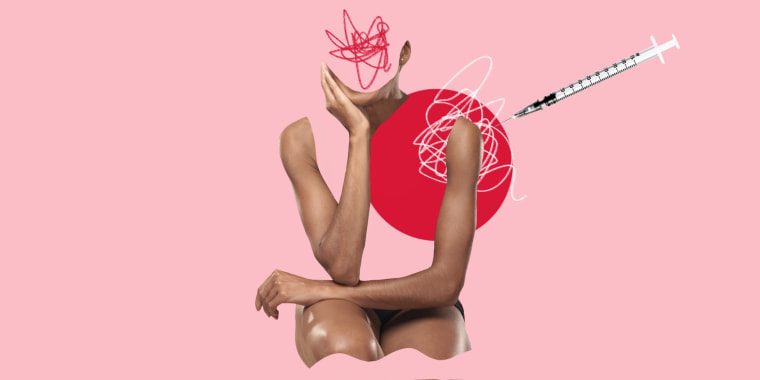While health experts are praising the creation of a COVID-19 vaccine as a very good thing, it's no secret that there are some side effects, albeit usually mild ones.
Common ones include pain and swelling at the site of the injection, as well as fatigue, headache, chills and occasionally a low-grade fever, according to doctors.
Fortunately, those side effects don't last long and there are some easy ways to manage them. Here's what to expect — and what you can do.
Soreness at the site of the injection
While a sore arm after a shot is typically no big deal, it can still be annoying.
First, the good news: That soreness is a sign that your body is developing an immune response to the vaccine, which is the entire reason for getting the shot in the first place, right? (That said, some people don't experience soreness at all — that doesn't meant the vaccine isn't working for them.)
To treat the pain, the Centers for Disease Control and Prevention suggests applying a "clean, cool, wet washcloth" to the site of the injection. Doctors told TODAY that warm compresses can also help.
Another tip? Stay active.
"Try to move your arm," said Dr. Allison Agwu, M.D., an associate professor of pediatrics who specializes in infectious diseases at Johns Hopkins Medicine. "Staying still will just increase muscle soreness."
While many people opt to get shots in their non-dominant arm, Agwu said she actually prefers to get shots in her dominant arm because she knows she'll be more likely to move it throughout the day, which helps minimize any soreness.
Muscle aches
A sore arm is common after many shots, but some people are also feeling soreness throughout their entire body after getting the COVID-19 vaccine.
"A few people mentioned to me that they felt like they just did a high interval impact training," said Dr. Bonnie Maldonado, M.D., a professor of pediatrics and an infectious diseases expert at Stanford University School of Medicine. "Their muscles felt sore. And not just at the site of the injection."
If that's the case, do whatever you'd ordinarily do to treat achy muscles. Drink lots of water and rest. A warm bath with Epsom salts can help, too.
Fatigue, fever and headaches
For a fever, the CDC recommends people drink lots of fluids and dress lightly. Rest and relaxation is the answer for fatigue and tiredness. Many doctors suggest people avoid scheduling their vaccine appointment before a busy day, so they're able to rest if they feel sluggish afterward. (Symptoms are often the most pronounced the next day, so keep that in mind.)
Dr. Daniel Griffin, head of infectious diseases for ProHEALTH, said people should also try to make sure they're feeling OK before they get their vaccine.
"We've noticed health care workers in particular who are working long hours, not taking great care of themselves, they're dehydrated, hungry — that's not a great situation to be in to go get vaccinated," he said. "Get a good night's sleep. Get something to eat and drink. If you go in to get your vaccine feeling pretty good, then you're going to feel better after."
There's been some confusion over whether it's safe to take over-the-counter painkillers before or after receiving the COVID-19 vaccine. On TODAY Friday, Dr. Vin Gupta clarified the guidance, explaining that people should avoid taking painkillers before getting the vaccine, but saying that it's OK to take something afterward if symptoms develop.
"Between Tylenol and Motrin, I would recommend going with Tylenol," he said. "We think that's going to interfere less with the antibody response, the antibody production, after your immune system sees the vaccine."
As Agwu put it, "If you need to take something for your headache, then by all means, please do that."
When to seek help
Side effects shouldn't last longer than 48 hours after getting the shot, and they often fade sooner than that. But if you're experiencing side effects days after getting the COVID-19 vaccine, contact a doctor.
There is one exception: While redness at the site of an injection immediately after a vaccine is common, some people are reporting a mild rash that appears on the arm a full week after getting the COVID-19 vaccine. Typically, it's not something to worry about and will go away in a few days, doctors said. If necessary, Griffin said people could take an antihistamine, such as Benadryl.
Maldonado also wants people to know what aren't potential side effects of the vaccine — namely, a cough, shortness of breath or chest pain.
"Some of the symptoms of COVID-19 and the vaccine overlap: headaches, muscle aches, fatigue, fever to a certain extent," she said. "But shortness of breath and chest pain are not symptoms you get after the vaccine. If you have those symptoms, contact your health care provider."
Experts are urging anyone who is nervous about the vaccine to remember that any side effects from the vaccine pale in comparison to a case of the coronavirus.
"It's a small price to pay for the knowledge that now your chance of dying from COVID is almost completely taken away," Griffin said.

